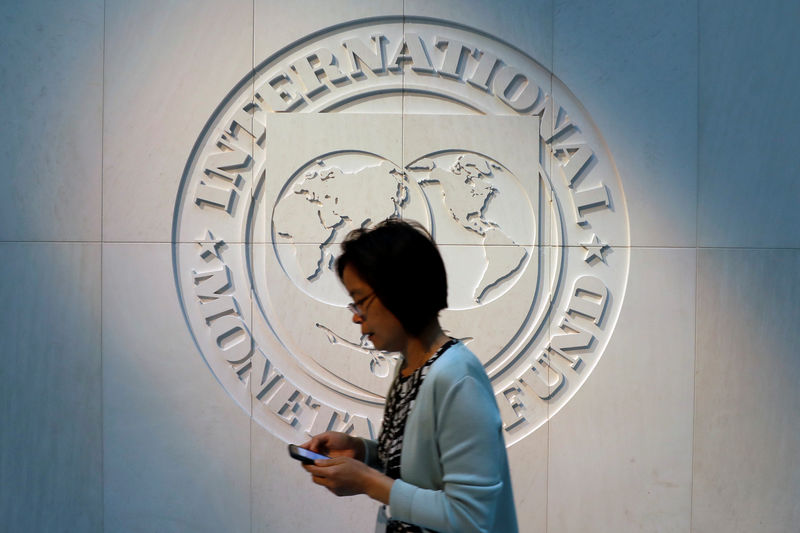(Bloomberg) --
The International Monetary Fund upgraded its global economic growth forecast for the second time in three months, while warning about widening inequality and a divergence between advanced and lesser-developed economies.
The global economy will expand 6% this year, up from the 5.5% pace estimated in January, the IMF said in its World Economic Outlook published on Tuesday. That would be the most in four decades of data, coming after a 3.3% contraction last year that was the worst peacetime decline since the Great Depression.
The fund, which with the World Bank is holding its spring meetings virtually this week, underscored that policy makers should scale back government support “gradually,” to avoid “fiscal cliffs.” Central bankers should also give “clear forward guidance” on monetary policy to minimize the danger of disruptive capital flows.
The IMF reiterated its call for wealthy nations to help poorer ones combat Covid-19, and underlined the need to prioritize health-care spending more broadly to defeat the pandemic.
President Joe Biden’s $1.9 trillion stimulus package passed last month will help boost U.S. gross domestic product to above its pre-pandemic level this year and will have sizable positive spillovers for trading partners.
For 2022, the fund saw global growth at 4.4%, higher than the 4.2% previously projected.
Still, many advanced economies will not return to their pre-pandemic output levels until 2022, the IMF said, and emerging-market and developing economies may take until 2023 to recover those levels. The world economy in 2024 will be about 3% smaller than anticipated before the Covid-19 outbreak, the IMF said last week.
“The outlook presents daunting challenges related to divergences in the speed of recovery both across and within countries and the potential for persistent economic damage from the crisis,” IMF Chief Economist Gita Gopinath said in the report.
Much of the focus of this week’s meetings will be on the IMF’s proposed $650 billion issuance of reserve assets known as special drawing rights, which aims to boost global liquidity and help emerging and low-income nations deal with mounting debt and Covid-19 health-care costs.
The response to last year’s crisis by policy makers prevented a collapse that would have been at least three times worse, and the medium-term losses for the global economy are expected to be smaller than the global financial crisis a decade ago, the IMF said Tuesday.
But low-income countries and emerging markets are seen suffering more this time around -- a contrast to 2009, when advanced economies were hit harder.
Related: IMF Says Fed Surprises Can Trigger Emerging-Market Outflows
The divergent recovery paths are likely to widen the global gap in living standards, the IMF said. The fund estimated per-capita income losses over the 2020-22 period in emerging and developing markets excluding China at the equivalent of 20% of the per-capita GDP figures for 2019. That’s much worse than the 11% the IMF sees in advanced economies.
Among other findings:
- About 95 million people are estimated to have fallen into extreme poverty in 2020
- The number of undernourished people is calculated to have grown by 80 million
Globally, economies dependent on tourism face a particularly difficult recovery outlook given the slow pace of normalization of cross-border travel expected, the fund noted.
But in advanced economies, pent-up demand will drive growth based on savings from 2020, as vulnerable people get vaccinated and contact-intensive industries resume, the IMF said.
Among the forecasts released Tuesday:
- Advanced economies will expand 5.1% this year, compared with the 4.3% previously seen
- Emerging market and developing economies will grow 6.7%, up from 6.3%
- U.S. is seen at 6.4%, up from 5.1% in January. The fund previously calculated the stimulus enacted in March will boost U.S. output by a cumulative 5% to 6% over three years
- The euro area will expand 4.4%, up from the 4.2% previously seen
- Japan will grow 3.3%, compared with 3.1%
- China is seen expanding 8.4%, up from 8.1%
- India will grow 12.5%, up from 11.5%
The IMF flagged the risk that, if virus mutations outpace the roll-out of vaccines, Covid-19 could become an endemic disease with an unknown severity.
Meantime, inflation data globally could turn volatile in the coming months, given record-low commodity prices a year ago, but the trend should prove short-lived, the IMF said. The muted outlook reflects a weak labor market, high unemployment and little worker bargaining power.
Global trade volume is expected to accelerate 8.4% this year on a rebound in goods purchases, up from the 8.1% gain seen in January.
©2021 Bloomberg L.P.
